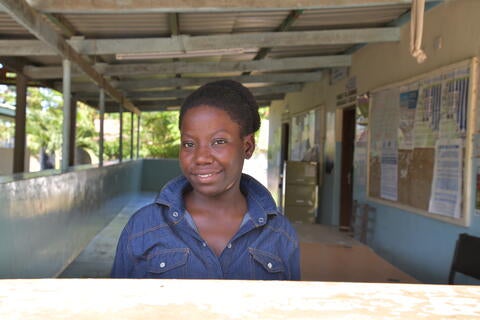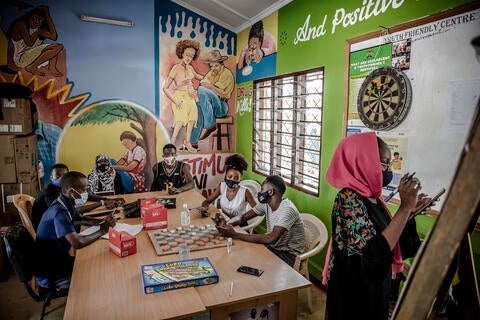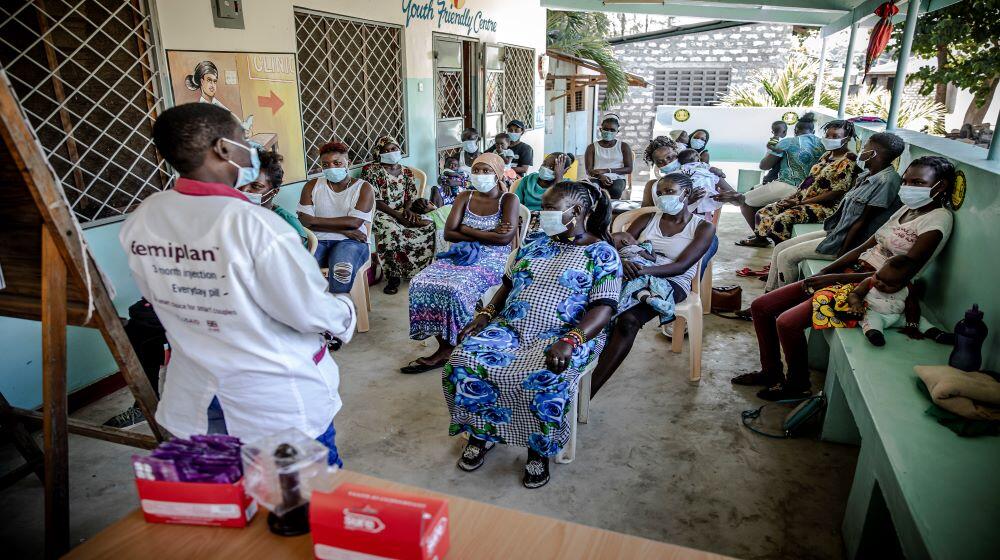Mtwapa Health Center is a small but busy facility that serves more than 60,000 residents living in Mtwapa town and the surrounding areas of Kilifi. For a young girl experiencing her first pregnancy, the long queues at the center’s ante-natal clinic, filled with older, more experienced mothers can prove to be intimidating.
“I got pregnant at 17, and the first time I came to the clinic, I remember feeling anxious and ashamed, worried that the nurses would treat me poorly and other mothers who are older than me would judge me,” says Mariam Moli. A community health volunteer noticed the nervous teenager in the queue and directed her to the dedicated youth-friendly clinic located within the health center.

mothers seeking services at Mtwapa Health Center.
Kilifi County has one of the highest teen pregnancy rates in Kenya, at 22 per cent, compared to the national average of 18 per cent (KDHS, 2014). Often, these first-time young mothers have little knowledge of and access to sexual and reproductive health information and services, including maternal health care. The youth-friendly clinic at the Mtwapa Health Center has proved to be a one-stop-shop for adolescent girls and young women such as Moli seeking sexual and reproductive healthcare.

a safe space for young people. UNFPA/Luis Tato
“Once they visit our clinic, young people get to access a wide range of services in one place, including antenatal and postnatal care, HIV testing and counseling, access to family planning, as well as information on prevention and response to sexual and gender-based violence,” says Medical Superintendent Dr. Sameer Mabruk.
This integrated approach to service delivery has been an integral part of the 2gether 4 SRHR programme, that combines the efforts of UNAIDS, UNFPA, UNICEF and WHO to improve the sexual and reproductive health and rights of all people, particularly adolescent girls, young people, and key populations. With funding from the government of Sweden, the programme through partnership with the Ministry of Health, county governments of Kilifi, Homabay, Narok and Kitui, and the International Centre for Reproductive Health (ICRH)-Kenya, has strengthened the capacity of more than 2,000 healthcare workers in the provision of quality integrated sexual and reproductive health and rights (SRHR) services.
At a stakeholder meeting held in May to take stock of achievements made through 2gether 4 SRHR, partners lauded the programme for strengthening access to services for vulnerable populations, and in particular adolescent girls. “Integration of HIV, gender-based violence, sexual and reproductive health service delivery is critical because these issues are interlinked and often have shared drivers such as poor access to information, gender inequality, and poverty,” remarked UNFPA Kenya Deputy Representative Ezizgeldi Hellenov. “Through 2Gether 4 SRHR, we have been able to increase the number of facilities offering integrated services across the 4 counties, which has increased access and uptake of services.”
The programme has also created a strengthened network of community health volunteers, mentors, and peer educators working to address social and cultural factors that prevent young people and key populations from making informed decisions to prevent unintended pregnancies, sexually transmitted infections, HIV, and gender-based violence. Facilities that provide services to vulnerable populations including sex workers are also linked to legal and psychosocial support mechanisms.
2gether 4 SRHR has also spearheaded efforts to build an enabling legal and policy environment, including providing technical assistance in the development of national guidelines such as the National HIV, SRH, GBV and TB Integration Framework 2018-2022, and the National condom strategy 2018-2023. Collectively, these initiatives are empowering communities to exercise their sexual and reproductive rights, adopt positive behavior change, and access quality integrated services in a timely manner.


